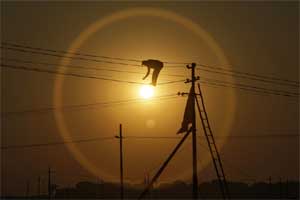“Stop interfering with the functions of the state regulatory commissions.” If you think this is the view of a power plant developer or an investment adviser, you are wrong. In a welcome change, the exhortation comes from a consumer rights body, which reckons delays in allowing tariff increases commensurate with increasing costs of power generation units could ultimately hurt the consumer.
Ahmedabad-based Consumer Education and Research Society (CERS) has written to power minister Piyush Goyal expressing the opinion that state governments must be prevented from arm-twisting the SERCs.
Also, a research organisation with the stated purpose of empowering consumers, CERS, cited three recent incidents in Delhi, Maharashtra and Gujarat where state governments issued directives to the regulators amounting to unwarranted interference in the functioning of the regulatory commissions.
The letter, a copy of which was also sent to Gujarat power minister Saurabh Patel, objected to the state government’s recent directive to the Gujarat Electricity Regulatory Commission (GERC) to not force government-owned distribution companies to install meters for consumers in the agriculture sector.
“ In the state of Gujrat, nearly 45% of farmers get electricity without having any electricity meters. Moreover, the government has also directed GERC not to increase tariff for metered agriculture consumers which is lowest in India at 60 paise/unit,” CERC noted.
As reported by FE recently, after showing some discipline to avail of the benefit of the 2012 financial restructuring plan (FRP), state-run power distribution companies have again relapsed into their old, financially unsustainable ways. Half a dozen discoms have failed to file the mandatory tariff review petition with the respective state electricity regulatory commissions (SERCs) for FY16.
It is not that CERC doesn’t find itself contesting the views of private power companies, though. Late last year, for instance, it had filed a petition before the GERC, claiming that Adani Power was ‘adopting unfair trade practices’ by shutting down eight units of its 4620 MW power plant at Mundra, Kutch.
In the latest communication to Goyal, the consumer rights body, however, cited Maharashtra power minister’s comment that the state regulator will not be allowed more than Rs 200-250 crore worth of tariff hike every year to buttress the case for freedom to SERCs from undue political influences. “Maharashtra’s tariff for 2015-16 is to be determined by state regulator (MERC) but the state government has directed it to not increase tariff of Electricity Companies by more than Rs.250 Crores. This is in direct violation of Electricity Act, 2003,” CERS said.
The consumer organisation also blamed the Delhi government for violating provisions of Electricity Act, 2003, on two accounts. One, it tried to coerce the state regulator to explain tariff hike between 2011-14 amounting to “direct interference”. Two, it also said said that the Delhi government’s subsidy to reduce electricity bill by half for those consuming up to 400 units violated the Act as the subsidy amount needed to be paid upfront.
Section 62 of the electricity act, 2003 says: “If the state government requires the grant of any subsidy to any consumer or class of consumers in the tariff determined by the state commission under section 62, the state government shall pay in advance and in such manner as may be specified.”
“The proposed amendments to Electricity Act, 2003, seek to correct the anomaly of interference by making it mandatory for state governments to appoint retired High Court judges as the chairman of the commissions. Currently, retired bureaucrats head most of the commissions making it prone to political interference,” KK Bajaj, chief general manager of CERS, told FE
For Updates Check Economy News; follow us on Facebook and Twitter
